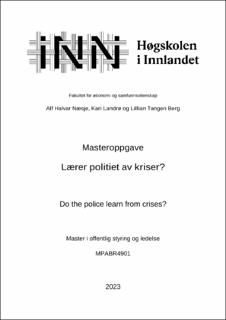| dc.contributor.advisor | | |
| dc.contributor.author | Næsje, Alf Halvar | |
| dc.contributor.author | Landrø, Kari | |
| dc.contributor.author | Berg, Lillian Tangen | |
| dc.date.accessioned | 2023-07-06T16:10:52Z | |
| dc.date.issued | 2023 | |
| dc.identifier | no.inn:inspera:147695654:148461508 | |
| dc.identifier.uri | https://hdl.handle.net/11250/3076708 | |
| dc.description.abstract | Målsetningen med denne undersøkelsen er å se nærmere på problemstillingen: Hvordan jobber politiet med organisatorisk læring etter en krise? For å besvare problemstillingen har vi utformet fire forskningsspørsmål med utgangspunkt i de fire momentene i læringssirkelen: Evaluering, læringspunkter, implementering, og øving og trening. Forskningsspørsmålene har vært: Hvordan jobber politiet med å evaluere egen innsats etter en krise? Hvordan følger politiet opp læringspunktene identifisert i evalueringer? Hvordan jobber politiet med implementeringsprosessen? Hvordan implementeres læringspunktene inn i politiets øving og trening?
For å avgrense oppgaven har vi valgt å ta utgangspunkt i Sør-Øst politidistrikt og Oslo politidistrikt som begge de to siste årene har håndtert kriser, henholdsvis Kongsberghendelsen den 13. oktober 2021 og terrorhendelsen i Oslo 25. juni 2022. Disse to hendelsene danner grunnlaget for vår undersøkelse.
For å besvare våre forskningsspørsmål har vi basert oss på informasjon hentet inn igjennom 14 kvalitative intervjuer. Vi har intervjuet ansatte som er ansvarlig for kompetanseheving i Politidirektoratet, Sør-Øst politidistrikt og Oslo politidistrikt, samt innsatspersonell som har vært direkte involvert i en av de to krisene vi har fokusert på i undersøkelsen vår.
Undersøkelsen viser at det mangler en helhetlig tilnærming til evalueringsprosessen som gjennomføres etter kriser, og det er variasjoner i hvordan politidistriktene følger opp læringspunktene som blir avdekket i evalueringene. Videre er det viktig at det settes av tilstrekkelig tid og ressurser for å gjennomføre implementeringsprosessen. Det er også viktig å prioritere og repetere mest mulig realistisk øving og trening for å styrke og opprettholde innsatspersonellets kompetanse.
Basert på undersøkelsen anbefaler vi at politiet etablerer et nasjonalt system for erfaringslæring for å sikre en helhetlig tilnærming til hvordan organisatorisk læring gjennomføres i hele politiet. Konsekvensene av at det mangler et helhetlig system for hele politiet, er at det er store variasjoner i den organisatoriske læringen, samt at det vanskeliggjør læring på tvers av politidistrikt. Dette kan i ytterste konsekvens ha en negativ innvirkning på politiets evne til å håndtere fremtidige kriser. | |
| dc.description.abstract | The aim of this master thesis is to study the following problem statement: How does the police work with organized learning after a crisis? To answer the aim of the study we have designed four research questions based on the four stages of the learning circle: Evaluation, learning points, implementation and exercises. These are: How does the police evaluate their own performance after a crisis? How does the police assess the learning points identified in evaluations? How does the police work with the implementation process? How does the police implement the learning points into training and practice?
We have studied the Sør-Øst Police District and Oslo Police District, which in the later years have been responsible for handling several crises as the Kongsberg incident on the 13. October 2021 and the terror incident in Oslo the 25. June 2022, respectively. These two serious incidents and the subsequent processes in the police are the main cases studied.
To answer our research questions, we have gathered information based on 14 qualitative interviews. We have interviewed employees in the police responsible for competence development in the National Police Directorate, Sør-Øst Police District and Oslo Police District, in addition to police response personnel whom were directly involved in one of the two incidents we have focused on in the study.
The study document that the approach to the evaluation process after a crisis is partly deficient and lack comprehensiveness, and that the police districts' follow-up of the learning points varies. In addition, the prioritization of the implementation process with sufficient time and resources can be improved. This is important to ensure realistic exercises for the police to maintain and improve their competence.
To ensure a comprehensive approach to organizational learning, we recommend that the police establish a national system to learn from experiences after a crisis. The consequences of not having such a system are large variations in the approach to organizational learning, and a unsatisfactory learning processes among police districts. In a worst-case scenario, this may have a negative consequence on the polices ability to handle future crises. | |
| dc.language | nob | |
| dc.publisher | Inland Norway University | |
| dc.title | Lærer politiet av kriser? | |
| dc.type | Master thesis | |
